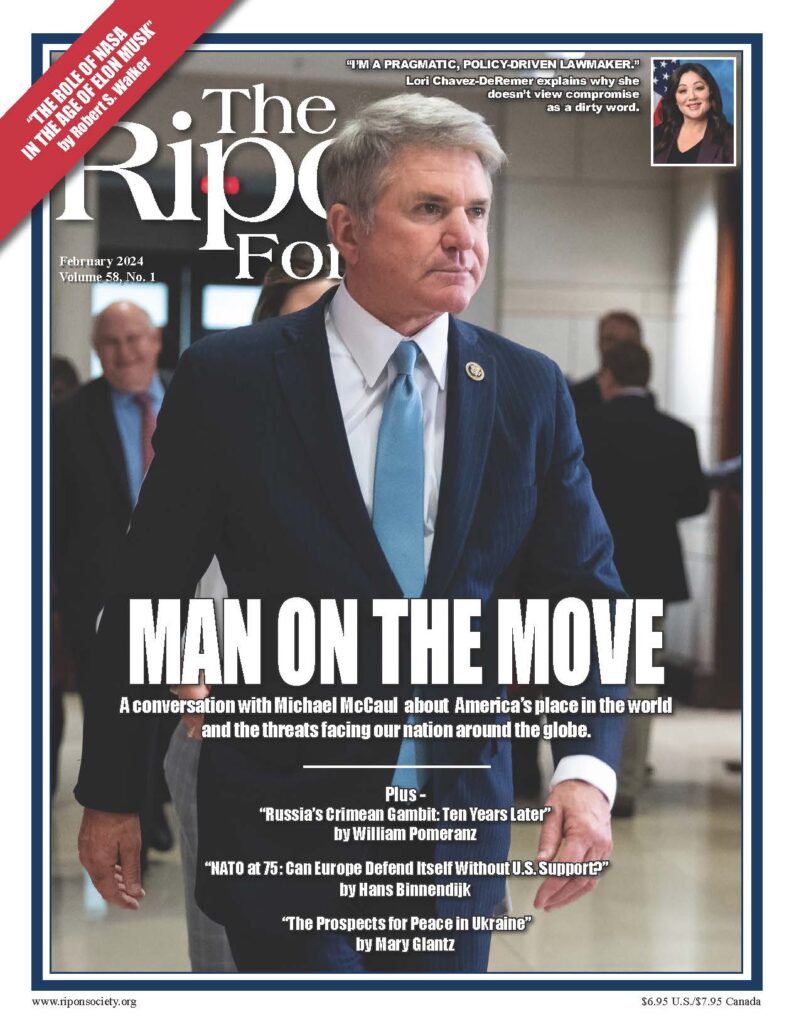Latest Ripon Forum talks with Michael McCaul about America’s place in the world & the threats facing our nation around the globe

WASHINGTON, DC — With the United States facing more global threats than perhaps at any time since the end of World War II, The Ripon Forum caught up with House Foreign Affairs Chairman Michael McCaul to get his read on these threats and the steps he believes Congress should take to confront them.
McCaul has been on the move over the past year, leading bipartisan delegations to Ukraine, Taiwan, and the Middle East to better understand the challenge that each of these volatile hotspots presents. Last month, he also led a delegation to America’s southern border to get a better sense of the crisis unfolding there. He is blunt in his assessment of the challenges facing America at home and around the globe.
“The world is on fire right now,” McCaul told the Forum, “and it’s time to recommit to a strong foreign policy that stands by our principles, ensures the safety of our citizens, and protects our jobs.” McCaul was equally blunt in his assessment of the threat posed by Russia, and why U.S. leadership is so important in the months ahead. “The implications of a Putin victory would reach far beyond Ukraine’s borders,” he said. “Following the disastrous withdrawal from Afghanistan, a U.S. decision to abandon Ukraine will make America less safe, convey weakness to our enemies, and make U.S. partners doubt our commitment.”
Two years after Russia’s invasion of Ukraine and 10 years after it’s illegal annexation of Crimea, William Pomeranz of the Kennan Institute examines both of these milestones in the context of history, and what both could mean for the future. “Opportunities were clearly lost to confront Russia for its aggression,” Pomeranz writes in an essay. “Going forward, however, we must understand that we are in a whole new world after Russia’s annexation of Ukrainian territory. We long thought imperialism was over after World War I and World War II, but it will take more than Cold War deterrence to confront Russia’s growing imperial appetites.”
With the war in Ukraine casting a new light on the importance of NATO and Europe’s ability to defend itself, Hans Binnendijk of the Atlantic Council says that while improvements have been made in Europe’s defensive capabilities, U.S. assistance will be critical for the foreseeable future. “The threats facing Europe are more dangerous now than at any time since the end of the Cold War,” Binnendijk writes in another essay for this latest edition. “With American leadership, the transatlantic allies have responded to those varied threats — especially Russia’s brutal invasion of Ukraine — with unity and a recommitment to defense. But Europe is not yet capable of meeting these threats alone.”
Mary Glantz of the U.S. Institute of Peace examines the prospects for peace in Ukraine and finds little cause for hope. “The absence of a stalemate (or a clear victory by either side) means the prospects of a negotiated peace are slim,” Glantz writes. “Russia is loath to quit when it believes victory is just a matter of time. Ukraine cannot concede because doing so would mean the end of their state and the spread of horrors like those seen in Bucha and the currently occupied territories.” Glantz also makes clear what’s at stake in the conflict. “This war is not just about Ukraine,” she writes. “It is about Putin’s vision of a new world order – a world order of chaos and conflict, which would threaten U.S. economic interests and risk sucking the United States into other conflicts throughout the globe.”
In other pieces for this latest edition of the Forum, U.S. Sen. Shelley Moore Capito looks at the impact of social media on young people and two measures she is supporting to keep our kids safe online. Former Chairman of the House Science Committee Bob Walker looks at the U.S. space program and the role of NASA in the age of Elon Musk. Rick Hess and Michael McShane of the American Enterprise Institute say it’s time for conservatives to put forward a plan to improve education that includes more than school choice, and have written a book with ideas to help achieve that goal. Attorney and good government expert Philip Howard also has a book out about another problem facing America — namely, the “corrosion of American culture” — which Forum editor Lou Zickar reviews.
Dr. Anand Parekh of the Bipartisan Policy Center examines the obesity epidemic in America, and puts forward some recommendations on what Americans can do to confront this crisis head on. Veteran policy professional Gary Sasse looks at the crisis at our nation’s border and explains why he believes Republicans should move forward with a positive plan to reform our immigration laws this year.
In the latest debate feature, Center for American Progress scholar Nicole Rapfogel and former Trump White House aide Brian Blase present two views of the Affordable Care Act. And in the latest Ripon Profile, Oregon Congresswoman Lori Chavez-DeRemer discusses her belief in bipartisanship and why she doesn’t view compromise as a dirty word.
The Ripon Forum is published six times a year by The Ripon Society, a public policy organization that was founded in 1962 and takes its name from the town where the Republican Party was born in 1854 – Ripon, Wisconsin. One of the main goals of The Ripon Society is to promote the ideas and principles that have made America great and contributed to the GOP’s success. These ideas include keeping our nation secure, keeping taxes low and having a federal government that is smaller, smarter and more accountable to the people.



